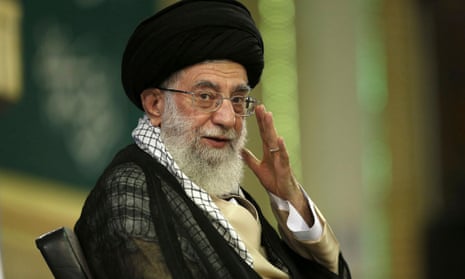Iran’s Supreme Leader, Ali Khamenei, made a speech last night to mark Ramadan, and to make a stand a few days before the June 30 deadline for completing a final, comprehensive deal with world powers on his country’s nuclear programme.
As is his wont, Khamenei framed the issue in terms of Iranian defiance in the face of an American-led campaign to destroy the country’s nuclear programme and thereby hobble Iran as a regional power. But he also went into detail, setting down apparent red lines on what Iran would accept. What has drawn attention is that his remarks seem to contradict parts of the provisional outline deal clinched in Lausanne at the beginning of April, as a waystation to a comprehensive agreement due to be finalised on Tuesday.
In particular, he said this (according to a Press TV translation):
The lifting of sanctions must not be contingent on the implementation of Iran’s undertakings. They should not say that you (Iran) should fulfill your commitments and the [International Atomic Energy] Agency (IAEA) should then verify it in order for the sanctions to be lifted. We do not accept this issue at all.
In his speech addressed to senior figures from government and parliament, Khamenei stipulated that economic and banking sanctions imposed on Iran by the UN and the US must be lifted on the day the agreement is signed. This appears to cut against the whole underlying ethos of the agreement under negotiation - sanctions relief in return for verified cuts in the Iranian programme. Certainly, it is a reading of a deal that is at odds with Lausanne parameters as portrayed by the US state department, which talks about the centrality of IAEA verification.
Similarly, the Supreme Leader said that Iran would not accept restrictions of its research and development work “for ten or twelve years”. On the face of it, this could represent a rejection of the part of the Lausanne deal that would prevent the use of new model centrifuges for enriching uranium for a decade.
Mark Fitzpatrick, the director of the non-proliferation and disarmament department at the Institute for International Strategic Studies described the speech as “very unhelpful” with “more and more unacceptable red lines, walking back the Lausanne accord”.
I have seen shades of pink in previous statements, but they seem to be more clearly red this time. If he is serious there can be no deal.
However, Iran experts have since been quick to stress that the Supreme Leader’s previous interventions have appeared similarly obdurate on the surface yet did not impede the conclusion of the preliminary Lausanne deal. They argue these speeches reflect Khamenei’s need to bring along conservative constituencies in Iran to ensure they are on board for any deal. Ariane Tabatabai, a visiting assistant professor at Georgetown University said:
It’s important not to read between the lines of what the Supreme Leader says too much. He’s trying to balance several audiences...So far, what many interpreted as clear and strict red lines have been neither clear nor strict
Ellie Geranmayeh, at the European Council on Foreign Relations, argued that if the Supreme Leader really wanted to sink the negotiations, we would have known about it before now.
The stakes are too high for Khamenei to risk losing the blame-game at this stage - if he really wanted to derail the talks, the best exit strategy would have been after the GOP Letter before the Lausanne agreement. Had he intervened at that stage, he could have broken the consensus amongst the P5+1 on sanctions. If Iran gets blamed for failure at this stage it gets nothing by way of economic relief after having frozen its nuclear programme for 18 months - and the leadership knows that.
She added that the Supreme Leader’s speech also repeated his support for the Iranian negotiators headed by foreign minister, Mohammad Javad Zarif. Khamenei called the Iranian diplomats at the talks “brave and faithful”, though he did add that they “may possibly make some mistakes”. No doubt those are words echoing in Zarif’s mind as he heads for Vienna this weekend for the last stretch of an almighty diplomatic marathon.

Comments (…)
Sign in or create your Guardian account to join the discussion